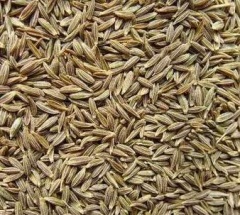Cuminseed
| Infobox on Cuminseed | |
|---|---|
| Example of Cuminseed |  |
| Facts | |
| Origin | See text |
| Stowage factor (in m3/t) | 2,04 m3/t (bags) |
| Humidity / moisture | - |
| Ventilation | - |
| Risk factors | See text |
Cuminseed
Contents
Description
Cumin is a flowering plant in the family Apiaceae, native from the east Mediterranean to India. Its seeds (each one contained within a fruit, which is dried) are used in the cuisines of many different cultures, in both whole and ground form.
Cumin is the dried seed of the herb Cuminum cyminum, a member of the parsley family. The cumin plant grows to 30–50 cm (0.98–1.6 ft) tall and is harvested by hand. It is an annual herbaceous plant, with a slender, branched stem 20–30 cm tall. The leaves are 5–10 cm long, pinnate or bipinnate, with thread-like leaflets. The flowers are small, white or pink, and borne in umbels. The fruit is a lateral fusiform or ovoid achene 4–5 mm long, containing a single seed. Cumin seeds resemble caraway seeds, being oblong in shape, longitudinally ridged, and yellow-brown in colour, like other members of the Umbelliferae family such as caraway, parsley and dill.
Cumin seeds are similar to fennel and anise seeds in appearance, but are smaller and darker in colour, like anise seed it also has a distinct flavour and aroma.
See also Seeds











